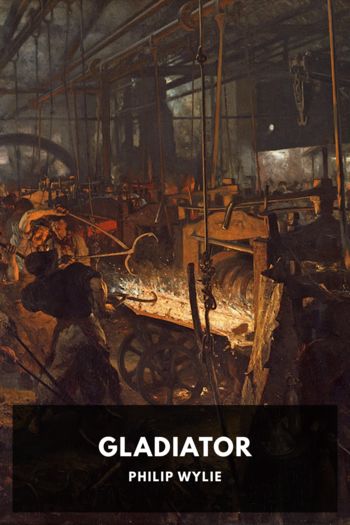Gladiator - Philip Wylie (readnow .TXT) 📗

- Author: Philip Wylie
Book online «Gladiator - Philip Wylie (readnow .TXT) 📗». Author Philip Wylie
Again she came out to the barn. “You’ve made me a dreadful hypocrite.”
“I know it.”
“You were waiting for me! Men are so disgustingly sure of everything!”
“But—”
“I’ve made myself cough and sniffle until I can’t stop.”
Hugo smiled broadly. “All aboard the carpet. …”
They lay in a field that was surrounded by trees. The high weeds hid them. Goldenrod hung over them. “Life can’t go on—”
“Like this,” he finished for her.
“Well—can it?”
“It’s up to you, Roseanne. I never knew there were women—”
“Like me? You should have said ‘was a woman.’ ”
“Would you run away with me?”
“Never.”
“Aren’t we just hunting for an emotion?”
“Perhaps. Because there was a day—one day—in the pines—”
He nodded. “Different from these other two. That’s because of the tragic formation of life. There is only one first, only one commencement, only one virginity. Then—”
“Character sets in.”
“Then it becomes living. It may remain beautiful, but it cannot remain original.”
“You’d be hard to live with.”
“Why, Roseanne?”
“Because you’re so determined not to have an illusion.”
“And you—”
“Go on. Say it. I’m so determined to have one.”
“Are we quarreling? I can fix that. Come closer, Roseanne.” Her face changed through delicate shades of feeling to tenderness and to intensity. Abruptly Hugo leaped to his feet.
The rhythmic thunder rode down upon them like the wind. A few yards away, head down, tail straight, the big bull charged over the ground like an avalanche. Roseanne lifted herself in time to see Hugo take two quick steps, draw back his fist, and hit the bull between the horns. It was a diabolical thing. The bull was thrown back upon itself. Its neck snapped loudly. Its feet crumpled; it dropped dead. Twenty feet to one side was a stone wall. Hugo picked up a hoof and dragged the carcass to the base of the wall. With his hand he made an indenture in the rocks, and over the face of the hollow he splashed the bull’s blood. Then he approached Roseanne. The whole episode had occupied less than a minute.
She had hunched her shoulders together, and her face was pale. She articulated with difficulty. “The bull”—her hands twitched—“broke in here—and you hit him.”
“Just in time, Roseanne.”
“You killed him. Then—why did you drag him over there?”
“Because,” Hugo answered slowly, “I thought it would be better to make it seem as if he charged the wall and broke his neck that way.”
Her frigidity was worse than any hysteria. “It isn’t natural to be able to do things like that. It isn’t human.”
He swallowed; those words in that stifled intonation were very familiar. “I know it. I’m very strong.”
Roseanne looked down at the grass. “Wipe your hand, will you?”
He rubbed it in the earth. “You mustn’t be frightened.”
“No?” She laughed a little. “What must I be, then? I’m alive, I’m crawling with terror. Don’t touch me!” She screamed and drew back.
“I can explain it.”
“You can explain everything! But not that.”
“It was an idiotic, wild, unfair thing to have happen at this time,” he said. “My life’s like that.” He looked beyond her. “I began wanting to do tremendous things. The more I tried, the more discouraged I became. You see, I was strong. There have been other things figuratively like the bull. But the things themselves get littler and more preposterous, because my ambition and my nerve grows smaller.” He lowered his head. “Some day—I shan’t want to do anything at all any more. Continuous and unwonted defeat might infuriate some men to a great effort. It’s tiring me.” He raised his eyes sadly to hers. “Roseanne—!”
She gathered her legs under herself and ran. Hugo made no attempt to follow her. He merely watched. Twice she tripped and once she fell. At the stone wall she looked back at him. It was not necessary to be able to see her expression. She went on across the fields—a skinny, flapping thing—at last a mere spot of moving color.
Hugo turned and stared at the brown mound of the bull. After a moment he walked over and stood above it. Its tongue hung out and its mouth grinned. It lay there dead, and yet to Hugo it still had life: the indestructibility of a ghost and the immortality of a symbol. He sat beside it until sundown.
At twilight he entered the barn and tended the cows. The doors of the house were closed. He went without supper. Cane returned jubilantly later in the evening. He called Hugo from the back porch.
“Telegram for you.”
Hugo read the wire. His father was sick and failing rapidly. “I want my wages,” he said. Then he went back to the barn. His trifling belongings were already wrapped in a bundle. Cane reluctantly counted out the money. Hugo felt nauseated and feverish. He put the money in his pocket, the bundle under his arm; he opened the gate, and his feet found the soft earth of the road in the darkness.
XXHugo had three hours to wait for a Chicago train. His wages purchased his ticket and left him in possession of twenty dollars. His clothing was nondescript; he had no baggage. He did not go outside the Grand Central Terminal, but sat patiently in the smoking-room, waiting for the time to pass. A guard came up to him and asked to see his ticket. Hugo did not remonstrate and produced it mechanically; he would undoubtedly be mistaken for a tramp amid the sleek travellers and commuters.
When the train started, his fit of perplexed lethargy had not abated. His hands and feet were cold and his heart beat slowly. Life had accustomed him to frustration





Comments (0)